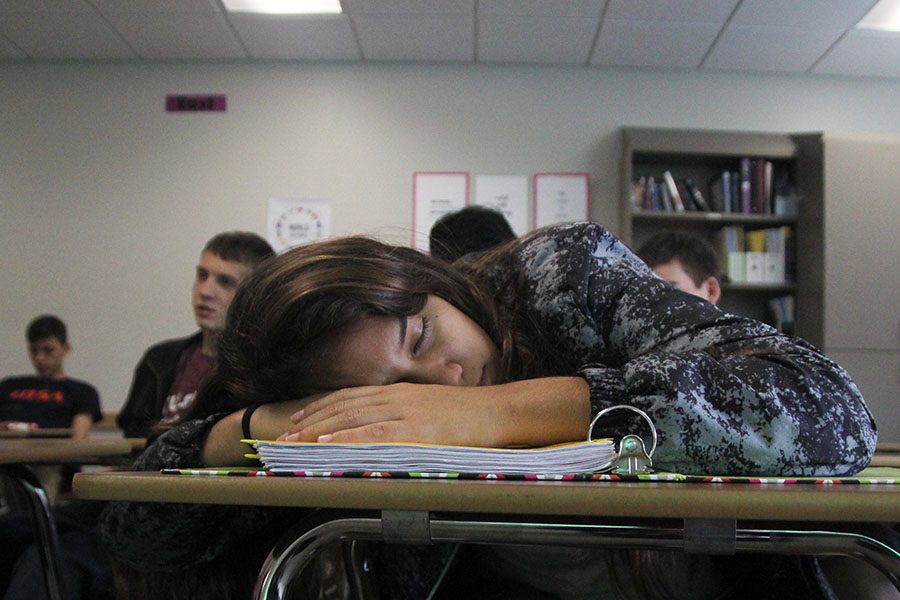Catching some Z’s
Class loads, extracurriculars and social media all contribute to sleep deprivation
Photo Illustration by James Flanagan
Students can drift off in class if they’re not getting enough sleep at nights.
November 16, 2015
The lights are turned off as students take out their college ruled notebooks. A PowerPoint about Rome’s history is first thing on the agenda as the dreaded white screen comes down. Hands frantically scribble notes, but at the back corner of the classroom there is the soft, continuing noise of snoring.
Teens are sleep deprived, staying awake late at night for homework, Netflix and social media posts. This affects their overall success in school and their daily life.
“I have pulled all-nighters for mostly all my classes,” sophomore Genesis Jovel said. ”My B-days are my hardest because that is when I have all my advanced classes. So I have to stay awake until I finish all my homework.”
Although Jovel doesn’t participate in any extracurricular activities she has English II Pre-AP, Algebra II Pre-AP, Chemistry Pre-AP and Spanish IV AP which keep her busy.
“If I want to learn something I’m committed to it even if I am exhausted,” she said. “I know it is something new and if I fall asleep I know I’ll miss it.”
Jovel has never fallen asleep in class even though she is tired, but there are some students who have.
“I’ve had all-nighters for all my classes,” sophomore Sydney Stauber said. “I’ve fallen asleep in my Geometry class while taking notes.”
According to the National Sleep Foundation, teens should have at least eight to 10 hours of sleep each day. Stauber gets about four to eight hours of sleep on school nights.
“During the day I’m very, very, very slow,” she said. “I can’t function correctly. I’m half zoned out throughout the day.”
While Jovel and Stauber are skipping ZZZs, junior Holly Ainsworth has found a way to avoid sleep deprivation.
“I’ve never pulled all-nighters,” Ainsworth said. “I usually stay up until 10 and if I still have other homework, I wake up at six in the morning.”
Ainsworth not only focuses on school work but she is involved in theatre, Health Occupation Students of America, UIL competitions and National Spanish Honor Society.
“They usually take up 10 hours a week,” she said. “Especially when I’m in musicals, they have a lot of rehearsals so I probably stay up till 11.”
Although all these students have a different lifestyle they agree on the importance of sleep. The National Sleep Foundation recommends that teens find a sleep and wake schedule, to give the body consistency and feel less tired.
“The advice that I would give to other people is just to find a schedule or a routine that works for them,” Jovel said. “You gotta stop stressing a lot, you gotta take everything calmly. The thing I would do is once you get your homework don’t wait for another day, do it the day you get it. For the phone, you gotta get off the thing, it’s just a device, it’s not going to die if you leave it.”



